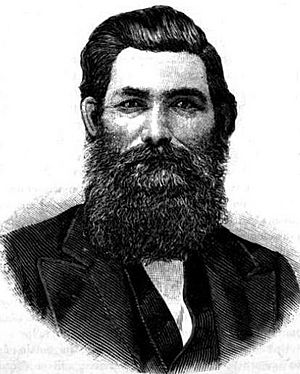Richard Warner (Tennessee politician) facts for kids
Quick facts for kids
Richard Warner
|
|
|---|---|

From 1882's Public Men of To-Day
|
|
| Member of the U.S. House of Representatives from Tennessee's 5th district |
|
| In office March 4, 1881 – March 3, 1885 |
|
| Preceded by | John M. Bright |
| Succeeded by | Samuel M. Fite |
| Member of the Tennessee House of Representatives | |
| In office 1879-1881 |
|
| Personal details | |
| Born | September 19, 1835 Chapel Hill, Tennessee |
| Died | March 4, 1915 (aged 79) Nashville, Tennessee |
| Political party | Democratic |
| Alma mater | Cumberland School of Law |
| Profession | lawyer politician |
Richard Warner (born September 19, 1835 – died March 4, 1915) was an important politician from Tennessee. He served as a U.S. Representative, which means he helped make laws for the entire country. He also worked as a lawyer and was involved in making laws for his home state.
Contents
Who Was Richard Warner?
Early Life and Education
Richard Warner was born on September 19, 1835, near a town called Chapel Hill, Tennessee. He went to public schools as a child. Later, he studied law at the Cumberland School of Law at Cumberland University in Lebanon, Tennessee. He finished his law studies in 1858.
After graduating, he became a lawyer in the same year. He started his law practice in Lewisburg, Tennessee.
His Time in Politics
Richard Warner served in the Confederate States Army from 1861 to 1865. After the American Civil War ended, he went back to Lewisburg, Tennessee to continue working as a lawyer.
In 1870, he was chosen to be a delegate. This meant he helped write a new constitution for the state of Tennessee. From 1879 to 1881, he was a member of the state's House of Representatives. This is where state laws are made.
Serving in Congress
Richard Warner was a member of the Democratic Party. He was elected to the United States Congress two times. He served in the Forty-seventh and Forty-eighth Congresses. His time in Congress was from March 4, 1881, to March 3, 1885.
During his second term, he was the chairman of the Committee on Mines and Mining. This committee focused on laws related to mining. In 1884, he tried to be nominated again for Congress but was not successful. After that, he went back to practicing law in Lewisburg, Tennessee.
Later Life
Richard Warner passed away in Nashville, Tennessee, on March 4, 1915. He was buried in the Warner Cemetery, which is near Chapel Hill, Tennessee.
 | Selma Burke |
 | Pauline Powell Burns |
 | Frederick J. Brown |
 | Robert Blackburn |

